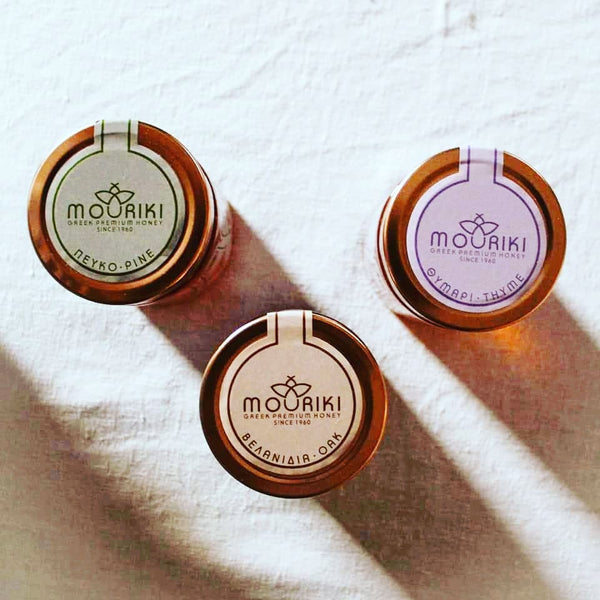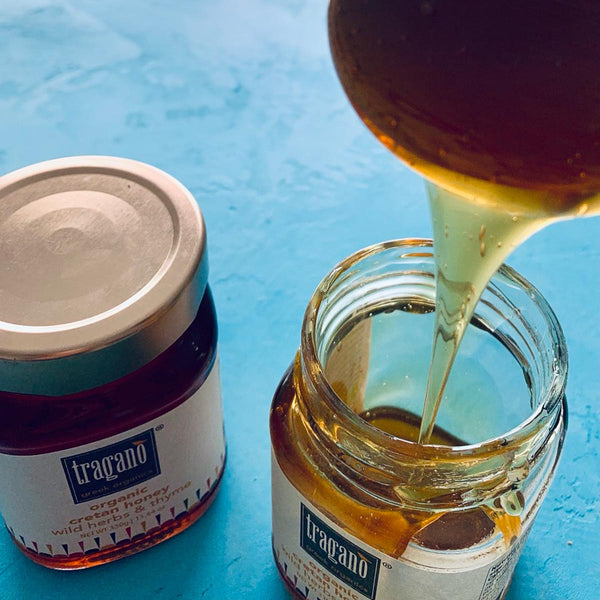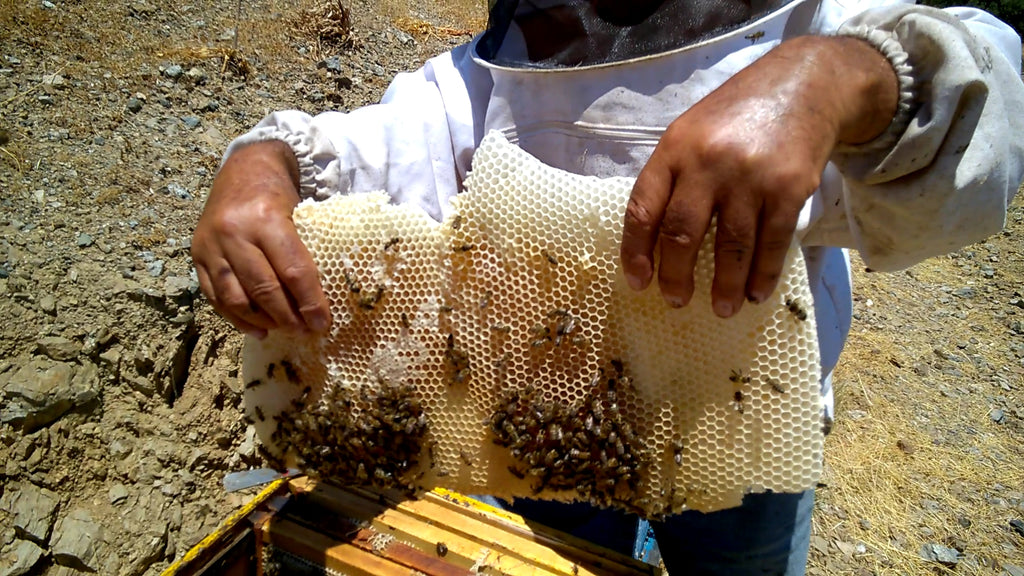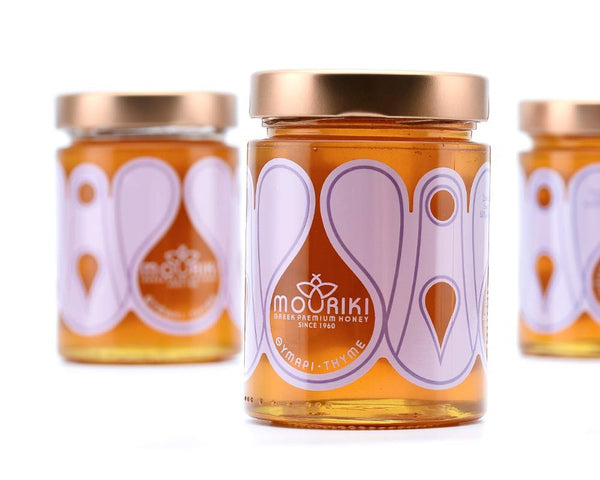Experience Greece: Food, Culture, Hidden Gems & Inspiring People!
Experience Greece: Food, Culture, Hidden Gems & Inspiring People!
ABOUT US
Unlocking the Sweet Secrets of Greek Honey: A Guide to its Rich Flavors and Health Benefits
6 min read

Indulging in a spoonful of Greek honey is like taking a journey to the sun-soaked hills of the Mediterranean. With its distinct floral notes and velvety texture, Greek honey is legendary around the world. But it's not just its delicious taste that makes Greek honey so special. This golden nectar is packed with health benefits that have been celebrated for centuries.
In this guide, Peloponnese-based writer Jean Fleming delves into the sweet secrets of Greek honey, exploring its rich flavors and the numerous ways it can benefit your well-being. From its potent antioxidant properties to its soothing effect on the throat, Greek honey is a superfood that will sweeten your life.
Whether you're a honey connoisseur or just dipping your spoon into the world of natural sweeteners, our guide will help you navigate the diverse world of Greek honey, with its unparalleled taste and remarkable health benefits. Get ready to unlock the secrets of this liquid gold!
The history and significance of Greek honey
Greek honey has a rich history that dates back thousands of years. Hives dating back to 3400 BC have been found in Greece. In ancient Greece, honey was considered a gift from the gods and was used in religious ceremonies and offerings. Hippocrates, the father of medicine, used honey to clean sores, bring down fevers, and help cure ulcers.
The significance of honey in Greek culture is still evident today. Greece is home to a wide variety of honey-producing regions, each with its own unique terroir that contributes to the distinct flavors and aromas of the honey produced there. Greek honey is not just a sweet treat; it's a symbol of tradition, craftsmanship, and the natural bounty of the Greek landscape.

The unique flavors of Greek honey
One of the most remarkable things about Greek honey is its range of flavors. Each varietal has its own distinct taste profile, influenced by the flowers and plants from which the bees collect nectar. From the delicate floral notes of thyme honey to the rich, caramel-like flavors of pine honey, there is a Greek honey to suit every palate.

Thyme honey is one of the most prized varieties of Greek honey. It is produced in the mountainous regions of Greece, where wild thyme plants thrive. With a light amber color and delicate, herbal aroma, thyme honey has a sweet, floral taste, hints of citrus and a lingering, slightly spicy finish. Thyme honey is particularly beloved by chefs and is often used in savory dishes, desserts, and even cocktails.
Pine honey, on the other hand, has a darker amber color and is more strongly flavored. Bees collect honeydew from the sap of pine trees, giving this honey a caramel-like taste with hints of resin and smoke. Pine honey is often enjoyed drizzled over Greek yogurt or used as a glaze for roasted meats, adding depth and complexity to any dish.
Oak honey a dark brown color reminiscent of molasses and an almost sour aftertaste. It’s produced by bees who collect a nectar formed from other insects inside the acorns of the oak tree, making it truly symbiotic in nature. Oak honey is considered especially good to aid digestion, thanks to high anti-bacterial properties.
You can also find chestnut honey in Greece, as well as heather, orange blossom and even lavender-thyme honey from the Cycladic islands of Milos & Kimolos. Greece's largest island, Crete, is also renown for its honey, the product of diverse landscape. Bees here feast on the island's wild thyme, sage, mountain tea and Cretan ebony to create a flavor unique to this beloved Greek island.

Health benefits of Greek honey
Greek honey is not only a delight for the taste buds but also a boon for your health. It is packed with a wide array of vitamins, minerals, and antioxidants that can support your overall well-being. Here are some of the health benefits of Greek honey:
- Antioxidant Powerhouse: Greek honey is rich in antioxidants, such as flavonoids and phenolic compounds, which help protect your cells from damage caused by free radicals. These antioxidants have been linked to a reduced risk of chronic diseases, including heart disease and certain types of cancer.
- Immune System Boost: Greek honey contains natural antibacterial and antifungal properties that can help strengthen your immune system and ward off infections.
- Soothe Sore Throats: Use Grandma's, Yiayia’s, home remedy for a sore throat. Add honey to a cup of Greek mountain tea, and sip the pain away, thanks to soothing and anti-inflammatory properties that can provide relief for sore throats and coughs.
- Digestive Aid: Greek honey has been used for centuries to aid digestion. Add it to a cup of warm water with a touch of lemon to settle an upset stomach.
- Energy Booster: The natural sugars in Greek honey provide a quick source of energy. It can be a healthier alternative to processed sugars and can help fuel your workouts or provide a pick-me-up during the day.
How Greek honey is produced
Producing Greek honey is a labor of love that begins with the bees. Drive into the countryside in Greece, and you’re likely to see bee hives situated in the best locations, ensuring that bees have access to a range of flowers and plants. This contributes to the unique flavors and aromas of Greek honey.
The bees collect nectar from flowers using their long tongues, which they then store in a specialized honey stomach. Once the bees return to the hive, they regurgitate the nectar into the honeycomb cells. The bees then fan their wings to evaporate excess moisture, resulting in the thick, viscous liquid we know as honey.

Greek honey is harvested by beekeepers who carefully extract the honeycomb from the hive. The honeycomb is spun in a centrifuge to separate the honey from the wax. The honey is then strained to remove any impurities before being jarred and ready for consumption.
How to choose and store Greek honey
When choosing Greek honey, it's important to look for authenticity and quality. Here are some tips to help you choose and store your Greek honey:
- Check the Label: Look for honey that is labeled as "100% Greek honey" or "Product of Greece." This ensures that you are getting honey that is made from Greek bees and harvested in Greece.
- Consider the Source: Greek honey is often sold by small-scale beekeepers who take pride in their craft. Look for honey that is produced by local beekeepers or cooperatives, as they are more likely to produce high-quality, artisanal honey.
- Look for Certification: Some Greek honeys may carry certifications, such as the Protected Designation of Origin (PDO) or Protected Geographical Indication (PGI). These certifications guarantee that the honey is produced according to strict quality standards and comes from a specific region in Greece.
- Store Properly: Greek honey should be stored in a cool, dry place away from direct sunlight. Avoid storing it in the refrigerator, as this can cause crystallization. If your honey crystallizes, simply place the jar in warm water to liquify it again.

Greek honey recipes and uses
Greek honey is incredibly versatile and can be used in a wide variety of dishes and beverages. Here are some delicious ways to incorporate Greek honey into your culinary repertoire:
Greek Yogurt with Honey and Nuts: Drizzle a spoonful of Greek honey over a bowl of creamy Greek yogurt and top with chopped nuts for a nutritious and satisfying breakfast or snack.
Banana Bread: Enjoy this delightful banana bread for breakfast, or as a snack with tea. Cretan honey gives it a unique flavor.
Honey and Greek Mountain Tea: Brew a cup of Greek mountain tea - well known as a natural analgesic - and sweeten with a spoonful of Greek honey. This soothing tea is perfect for cold winter days or when you need a comforting pick-me-up.
Almond Encrusted Feta with Honey: Dazzle your guests with this delicious Greek appetizer or meze. Honey, feta, nuts and pomegranate juice combine for an unforgettable and elegant appetizer.
Melomakarona, Greek Christmas Cookies, owe their irresistible appeal to the use of honey, an integral part of Greece's festive customs. Honey forms the basis of the luscious syrup that saturates these cookies, rendering them moist and delightfully sweet. Try both our traditional melomakarana recipe and our chocolate flavored melomakarona recipe for a taste of Greece during the holidays or any time you crave an indulgent treat.

Where to buy authentic Greek honey
Authentic Greek honey is, of course, best when you buy directly from the bee keeper, at a Greek farmers’ market or along the side of the road. But if that’s not an option, we offer a wide selection of Greek honey, all of which are organic and made by small batch producers committed to quality and tradition.
When buying Greek honey, it's important to do your research to ensure that you are getting an authentic and high-quality product. Avoid buying honey that is overly processed or comes from unknown sources.

Conclusion: Embracing the sweetness of Greek honey
Greek honey is a true culinary treasure, offering a myriad of flavors and health benefits. From its rich history to its diverse range of varietals, Greek honey has captivated the world with its unparalleled taste and unmatched quality.
Whether you enjoy it drizzled over yogurt, used in cooking and baking, or simply savored by the spoonful, Greek honey is a natural sweetener that can elevate any dish or beverage. So, embrace the sweetness of Greek honey and let it transport you to the sun-drenched hills of the Mediterranean with each delicious taste.
Author: Jean Fleming, a writer based in the Peloponnese region of Greece
Buy Greek Honey at Zelos
Leave a comment
Comments will be approved before showing up.
Like what you read? Sign-up for more & get 15% OFF!
Sign up for our newsletter and get 15% OFF, plus the best Greek recipes, uncrowded and unspeakably cool destinations in Greece, and the newest offerings from our amazing Artisans.




